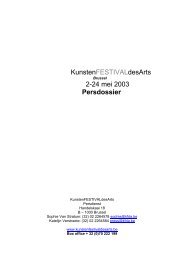Press File - Kunstenfestivaldesarts
Press File - Kunstenfestivaldesarts
Press File - Kunstenfestivaldesarts
You also want an ePaper? Increase the reach of your titles
YUMPU automatically turns print PDFs into web optimized ePapers that Google loves.
In one of the last lieder (18),Trockne Blumen (Withered Flowers), this obsession gives way to an<br />
apparently calmer, but infinitely more disconsolate state. Spring, a time for love and revival, will<br />
only blossom for this wandering young man when he is dead: dann, Blümlein alle, heraus,<br />
heraus! Der Mai ist kommen, der Winter ist aus. Then, little flowers, spring forth, spring forth!<br />
May has arrived, and winter is over.<br />
Das Wandern (Wandering), the first lied in the cycle of Die Schöne Müllerin, is written in B flat<br />
major; the last Des Baches Wiegelied (The Brook’s Lullaby), in E Major. The augmented fourth<br />
– also known as ‘diabolus in musica!’ during the baroque period – and without doubt the most<br />
shocking and saddest interval between the first and last lied, is probably a deliberate choice by<br />
Schubert: ‘going out into the world” is turned into ‘going out beyond the world’.<br />
When one suffers for the world, one dedicates body and soul to something else, and there is no<br />
doubt that Schubert’s music can be defined as a way of entirely abandoning oneself, even if it is<br />
dangerous to project a work’s codes on the biography of an artist and vice versa.<br />
Schubert composed with a radical subjectivity almost impossible to maintain. In this respect he<br />
differs quite markedly from Ludwig von Beethoven, a composer he admired through out his<br />
entire life but whom he could not really get close to, even in his dreams. In its middle period,<br />
Beethoven’s music harbours what was at least a rhetorical impulse to changes and<br />
improvements to the world. Schubert’s own attitude was very different: the gentleness in his<br />
style of composing often givens an impression of inactivity, as if he was hesitating to open up,<br />
as if he was revealing both a sharp and gentle sense of communion with the world. In his essay<br />
on the phenomenon of weather in Schubert, Dieter Schnebel describes the first part of the piano<br />
sonata in B flat major (D. 960) “as the protocol of a life crumbling away by action more tentative<br />
than deliberate.”<br />
Schubert created a space where he gave himself time, another form of ‘Melos’ (Ancient Greek<br />
for singing), another totally subjective rule of behaviour that uses processes of composition that<br />
bring conventions to an end.<br />
His compositions give more and more substance to subjectivity as the expression of a frame of<br />
mind, of a feeling. The intimacy of the lied is created by words that we hear being sung by<br />
another while making them ours. Schubert’s lieder are completely recognisable: they evoke a<br />
collective or as it were a social process where everyone hears their own song, their own life<br />
being sung.<br />
8






